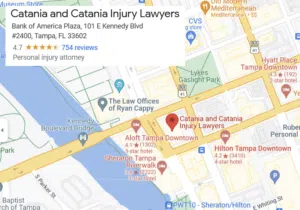
Many of the issues in personal injury cases derive from case law. For example, the elements used to prove negligence come from Florida’s common law rather than Florida’s statutes.
But Florida’s legislature has passed several statutes to regulate personal injury claims. These statutes regulate the deadlines for filing lawsuits and define who is eligible to file car accidents suits.
Here, we’ll explore the ways that Florida’s statutes affect personal injury claims.
Table of Contents
How do Florida Statutes Affect Automobile Accident Claims?
Florida currently uses a no-fault insurance system for auto accident claims. Under Florida’s statutes, insurance companies handle almost all car accident claims.
Florida’s No-Fault Insurance Statutes
Florida’s no-fault insurance statutes require insurers to offer personal injury protection (PIP) coverage. The statutes also require all vehicle owners in Florida to buy PIP insurance.
Florida’s no-fault statutes contain several limitations on personal injury claims that arise from car accidents, including:
No Pain and Suffering Damages
Injured people cannot claim damages for pain and suffering under PIP coverage. In other words, PIP insurance only covers medical bills and lost income.
Caps on Medical Benefits
Florida’s no-fault insurance statutes contain two important limitations on medical benefits.
First, Florida insurers only need to pay 80% of your medical expenses. This means that you effectively have a 20% copay for all medical expenses covered by PIP.
If you have health insurance, it may cover the portion left unpaid by your PIP coverage. If you have no health insurance, the responsibility for the remaining 20% of your medical bills will fall on you.
Second, the minimum PIP coverage in Florida is capped at $10,000. This means that Florida insurers only need to pay $10,000 toward the first $12,500 of your medical bills if you buy the minimum policy.
After your medical bills exceed $12,500, your PIP benefits run out. The responsibility for any further bills will fall on your shoulders. If you do not file a lawsuit against the driver that caused the crash, you must pay the bills that exceed your PIP policy limits.
Cap on Income Benefits
Normally, your economic damages would include your medical bills and your lost income. Florida’s no-fault statutes cap the income benefits you are eligible to receive at 60% of your gross income.
Florida aggregates your medical and income benefits. The total amount cannot exceed the policy limit.
Limitations on Who Can Sue
Under Florida’s statutes, you cannot sue a driver after a car accident unless you meet an exception.
First, if your total economic damages exceed your PIP policy limits, you can sue for the unreimbursed bills.
For example, suppose that you have $25,000 in medical bills and lost income after a car accident. Your PIP insurance paid $10,000 in benefits before your benefits ran out. This would leave $15,000 in unreimbursed expenses. You would then be able to sue the at-fault driver to recover $15,000 in damages.
Second, you can file a lawsuit if you suffer a permanent injury involving:
- Permanent loss of body function
- Permanent injury
- Permanent scarring or disfigurement
- Death
If you suffer from a permanent injury, you can sue for your unreimbursed economic damages, but also for non-economic damages like pain and suffering.
Time Limit for Seeking Medical Treatment
To become eligible for PIP benefits under Florida’s no-fault statutes, you must seek medical treatment within 14 days after a car accident.
Florida Statutes that Apply to All Claims
Florida has a few statutes that apply to all personal injury claims, whether they arise from a car accident, slip and fall accident, or medical error.
Statute of Limitations
A statute of limitations sets the deadline for filing a lawsuit. Most personal injury cases arise from negligence. Under Florida’s statute of limitations, you have two years to file a lawsuit regarding negligence.
Additionally, Florida’s statute for medical malpractice is complicated and you must file a lawsuit for medical malpractice within two years of:
- The medical error
- The discovery of the medical error
- The time the medical error should have been discovered
Suppose that a surgeon operated on you and accidentally left an instrument inside of you. You suffered pain due to the lost instrument, but the surgeon attributed this to normal post-operative pain.
If you tolerate the pain for less than two years before seeing another doctor, you can probably file a lawsuit after the second doctor finds the instrument. You would fall below the time limits for all three courses of action.
But if you wait longer than two years before seeking a second opinion, you jeopardize your lawsuit because the original surgeon can argue that you should have discovered the instrument by seeking a second opinion sooner.
Comparative Negligence
Comparative fault decreases your compensation by your share of the fault for an accident. Florida employs a “pure comparative negligence” statute. This means that you can recover compensation even if your share of the fault exceeds that of the people or businesses you sue.
For example, suppose that you fell down the stairs at a hotel because of a roof leak that created a puddle on the stairs. You could file a lawsuit for your injuries because the hotel was negligent in failing to discover the puddle, clean it up, or close the stairwell.
But if security video from the stairwell shows that you were looking at your phone when you walked down the stairs, a jury might find that you share some responsibility for your injuries. If the jury attributes 15% of the fault for your injuries to you, a judge will reduce your compensation from the hotel to 85% of the damages awarded by the jury.
Contact a Tampa Personal Injury Lawyer to Discuss Your Claim
These statutes cover only a few of the issues that may arise in a personal injury claim. To get a complete picture of the statutes that might affect your claim, you should discuss your case with a Tampa personal injury lawyer.
Lawyers can draw in their prior experience and knowledge of the law to identify potential issues in your case. They can also help you to develop a legal strategy to overcome any obstacles posed by the statutes in place.
Contact our law office in Tampa, FL at (813) 222-8656, to discuss your injury case with a skilled member at Catania and Catania Injury Lawyers for a free consultation.




